Resource Center
The Transit Workforce Center is pleased to host a curated collection of publications and other materials to assist stakeholders engaged in transit workforce development. The Resource Center includes case studies, training materials, research reports, and other materials of interest, including publications produced by federal government agencies, transit organizations, and independent research entities. Resources may be filtered by topic, resource type, and transit mode. This TWC blog post explains how to use the Resource Center.
We are continuing to update the Resource Center regularly. Please contact us via the Request Help menu option if you would like assistance using the Resource Center or are looking for resources on a particular topic. We also welcome suggestions of topics or specific resources to add.
Content in external resources linked from the Resource Center is solely the responsibility of the resource authors and does not necessarily reflect the perspectives of or endorsement by the Transit Workforce Center.
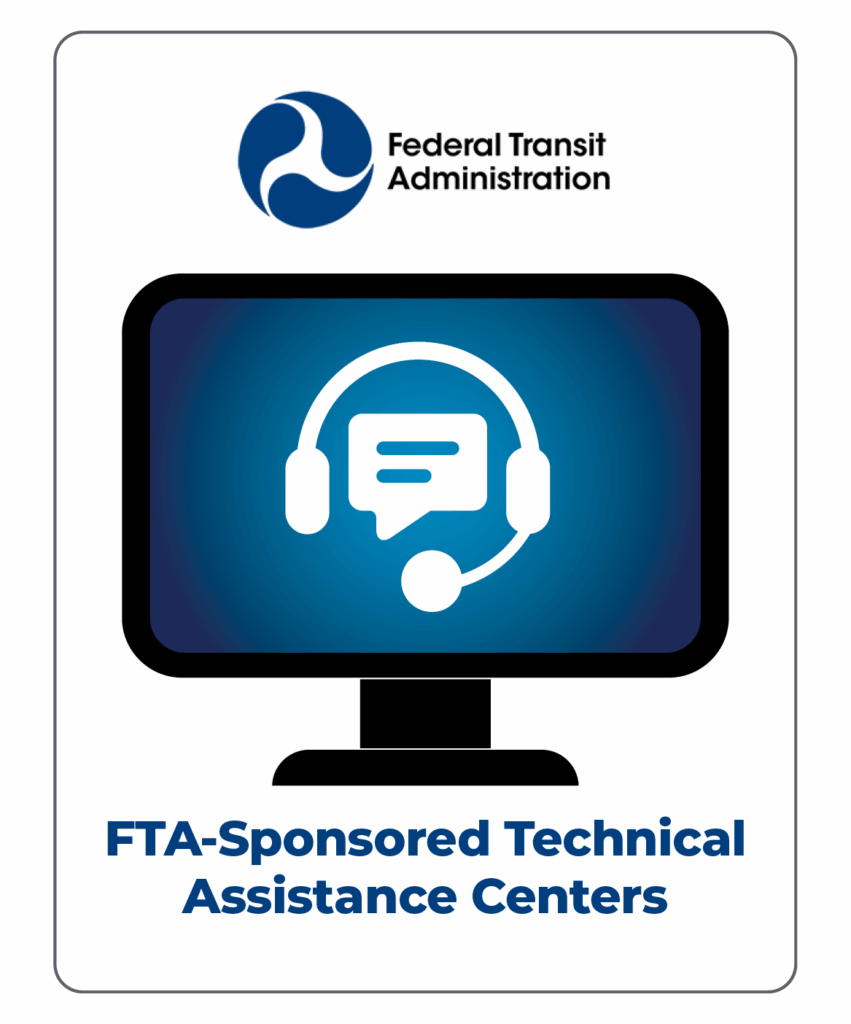
FTA-Sponsored Technical Assistance Centers
FTA’s Technical Assistance and Workforce Development Program (49 U.S.C. § 5314) and the Public Transportation Innovation Program (49 U.S.C. § 5312) fund technical assistance centers through national nonprofit organizations across a number of areas to improve public transportation. These nonprofit partners and the work they do play a critical role in supporting public transit agencies.
Federal Transit Administration
TOPICS: Apprenticeship, Career Pathways, Community Engagement, Hiring and Recruitment, Labor-Management Partnerships, Low-No, Mentorship, Policy and Planning, Procurement, Program Evaluation and ROI, Retention, Safety and Health, Trainer and Mentor Development, Training, Workforce Shortage
FTA’s Technical Assistance and Workforce Development Program (49 U.S.C. § 5314) and the Public Transportation Innovation Program (49 U.S.C. § 5312) fund technical assistance centers through national nonprofit organizations across a number of areas to improve public transportation. These nonprofit partners and the work they do play a critical role in supporting public transit agencies. Their services help to:
- Improve transportation for older adults and people with disabilities
- Drive the adoption of mobility management and related promising practices
- Accelerate innovative mobility practices and strategies
- Support rural communities
- Leverage new transit technologies
- Train the public transit workforce
- Provide workforce development technical assistance
- Support research projects chosen by the transit industry that address day to day issues
- Support the transit industry meet safety regulations
National Center for Applied Transit Technology (N-CATT)
The National Center for Applied Transit Technology (N-CATT) delivers expert, focused technical assistance to transit agencies and organizations in rural areas and small cities to use or develop transit technologies and innovations that make services more cost-effective and efficient. N-CATT’s work supports FTA’s mission and focus on innovation by developing and supporting transit programs and services in rural and small-city America.
National Aging and Disability Transportation Center (NADTC)
The National Aging and Disability Transportation Center (NADTC) is a national technical assistance center funded by FTA with guidance from the U.S. Department of Health and Human Services’ Administration for Community Living to promote the availability of transportation options that serve the needs of people with disabilities, seniors and caregivers with a focus on the Section 5310 program and other transit investments. NADTC supports the delivery of more effective, efficient, high-quality and coordinated specialized transportation services that maximize federal investments. NADTC provides technical assistance, information and referral; develops field training; implements interactive communication and outreach strategies; and supports communities in assessing their needs and developing innovative transportation solutions.
National Rural Transit Assistance Program (National RTAP)
The National Rural Transportation Assistance Program (RTAP) was established by FTA in 1987 to provide a wide range of professional services and products. National RTAP addresses the training and technical assistance needs of rural and tribal transit programs across the nation and supports state RTAP programs. National RTAP provides comprehensive free technical assistance programs and resources including training materials, webinars, newsletters and technical briefs, peer resources, research, and innovative technology initiatives. The National RTAP also manages the Transportation Technical Assistance Coordination Library (TACL), which provides a sustainable methodology and platform to access resources across a diverse range of transportation technical assistance centers and FTA.
Shared-Use Mobility Center (SUMC)
The Shared-Use Mobility Center is a public-interest organization dedicated to achieving equitable, affordable, and environmentally sound mobility across the US through the efficient sharing of transportation assets. By connecting the public and private sectors, piloting programs, conducting new research, and providing policy and technical expertise to cities and regions, SUMC seeks to extend the benefits of shared mobility for all. The Shared Mobility 2030 Action agenda includes improving access to public transit, on-demand shuttles or buses, ride-on-demand services, carpooling and vanpooling, and carsharing, bikesharing and scooter-sharing.
Coordinating Council on Access and Mobility (CCAM)
The strategic goal of CCAM, operated but the Community Transportation Association of America, is to support federal agencies, their grantees, partners, and stakeholders in improving transportation access for people with disabilities, older adults, and individuals of low income. CCAM promotes and facilitates human services transportation, public transit, and non-emergency medical transportation (NEMT) coordination that advances people’s access to everyday destinations.
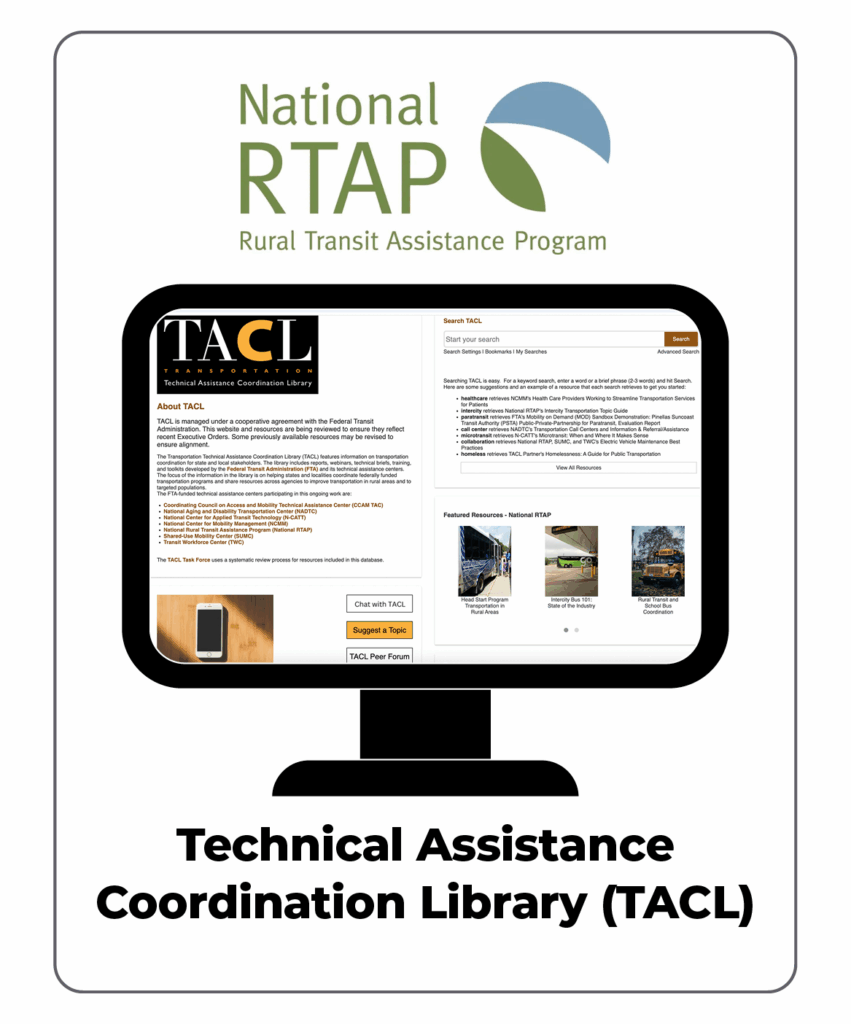
Technical Assistance Coordination Library (TACL)
The Transportation Technical Assistance Coordination Library (TACL) provides a viable methodology and platform for access and findability of rural and tribal transit coordination resources across a broad range of transportation technical assistance centers and the Federal Transit Administration (FTA).
National Rural Transit Assistance Program
TOPICS: Apprenticeship, Career Pathways, Community Engagement, Hiring and Recruitment, Labor-Management Partnerships, Low-No, Mentorship, Policy and Planning, Procurement, Program Evaluation and ROI, Retention, Safety and Health, Trainer and Mentor Development, Training, Workforce Shortage
Transportation Technical Assistance Coordination Library (TACL)
The Transportation Technical Assistance Coordination Library (TACL) provides a viable methodology and platform for access and findability of rural and tribal transit coordination resources across a broad range of transportation technical assistance centers and the Federal Transit Administration (FTA).
The FTA-funded Technical Assistance (TA) Centers participating in this ongoing work are:
- National Aging and Disability Transportation Center (NADTC)
- National Center for Applied Transit Technology (N-CATT)
- National Center for Mobility Management (NCMM)
- National Rural Transit Assistance Program (National RTAP)
- Shared Use Mobility Center (SUMC)
- Transit Workforce Center (TWC)
The TACL Task Force uses a systematic review process for resources included in the database. New resources will be added on a quarterly basis. Let us know if you would like to serve as a peer reviewer for our resources.
Why was TACL created?
The United States Government Accountability Office (GAO) published Public Transportation: Enhanced Federal Information Sharing on Coordination Could Improve Rural Transit Services in January 2020. GAO recommended that FTA “develop a communication plan that will effectively share information with state and local stakeholders on coordination opportunities in an accessible and informative way.” This effort was created to improve interagency resource coordination between FTA and its five TA Centers.
How can TACL be used?
TACL resources can be used to identify high quality technical assistance on transportation coordination. The resources can be used for research, training, practice, operations, planning, and other purposes. We encourage authors to cite TACL resources.
Ready to get started?
Visit http://transportation-tacl.org. Click on the Training tab at the top for instructions.
If you have a question about TACL, or if you would like to be considered to become a TACL peer reviewer, please contact info@nationalrtap.org
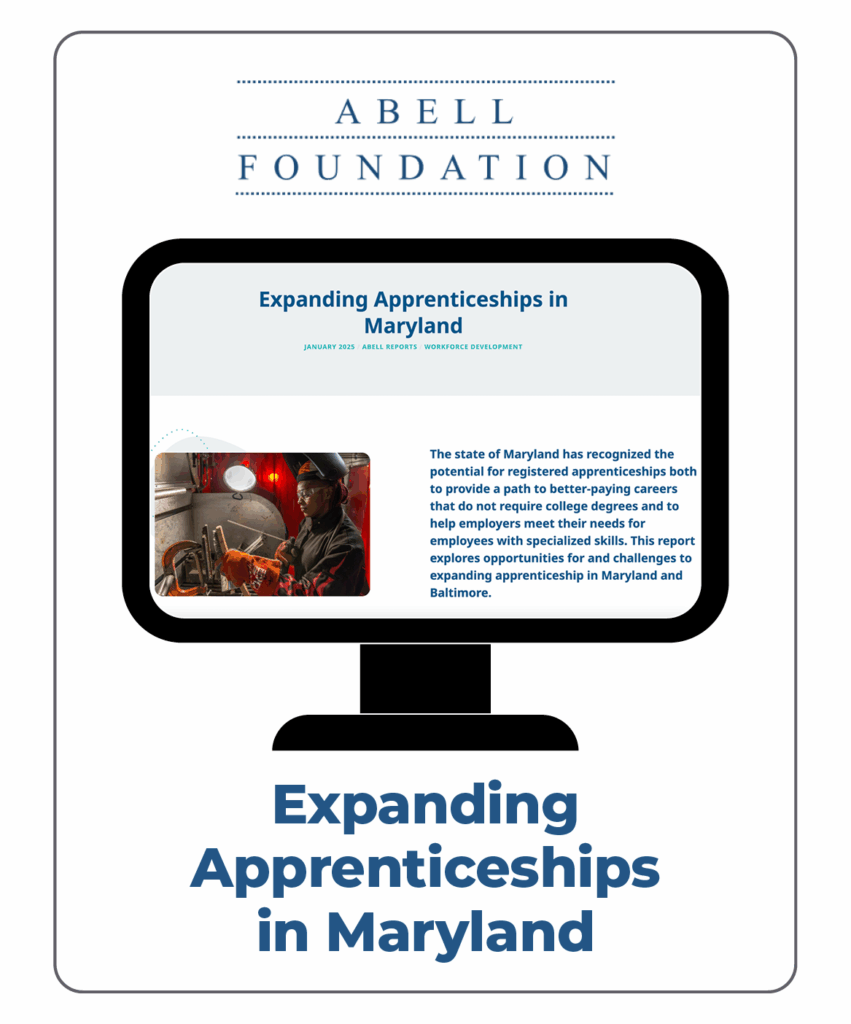
Expanding Apprenticeships in Maryland
The state of Maryland has recognized the potential for registered apprenticeships both to provide a path to better-paying careers that do not require college degrees and to help employers meet their needs for employees with specialized skills. This report explores opportunities for and challenges to expanding apprenticeship in Maryland and Baltimore.
Abell Foundation
January 2025
LEARN MORE
The report includes topics such as overcoming barriers to participation, such as transportation and childcare; countering employer misconceptions about apprenticeship; supporting apprenticeship in non-traditional sectors; and improving data collection and analysis.
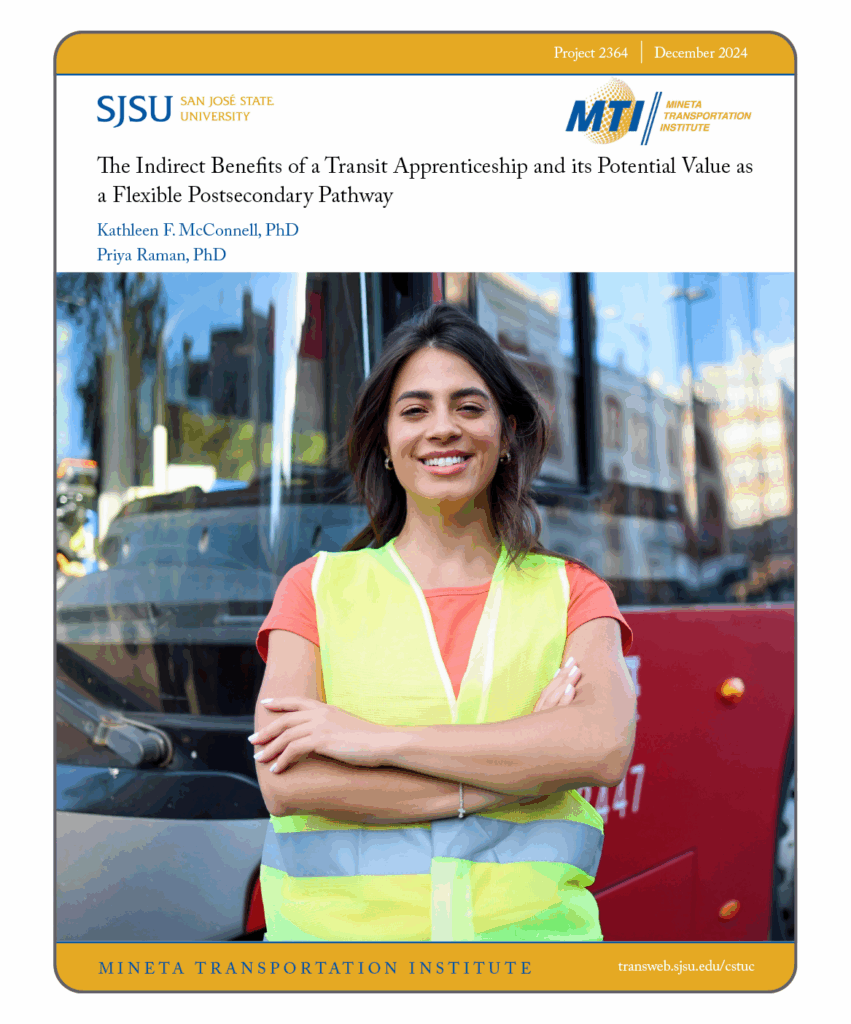
The Indirect Benefits of a Transit Apprenticeship and its Potential Value as a Flexible Postsecondary Pathway
As apprenticeships become more prevalent in the transit industry, they can also emphasize both technical and soft skills to invest in career advancement. This can attract young people to transit careers, which helps address challenges with recruitment and an aging workforce. Santa Clara Valley Transportation Authority’s Joint Workforce Initiative (JWI) employs this model by formally recognizing skills acquisition with accredited certificates. This study explores the JWI’s strengths within the revival of non-degree credentials fueled by efforts like the California Guided Pathways Program. Drawing on guidelines for connecting job training with degree programs, the study details the importance of affordability, portability, and articulation and outlines how these features could be further developed in the JWI.
Mineta Transportation Institute
December 2024
TOPICS: Apprenticeship, Career Pathways, Community Engagement, Hiring and Recruitment, Workforce Shortage
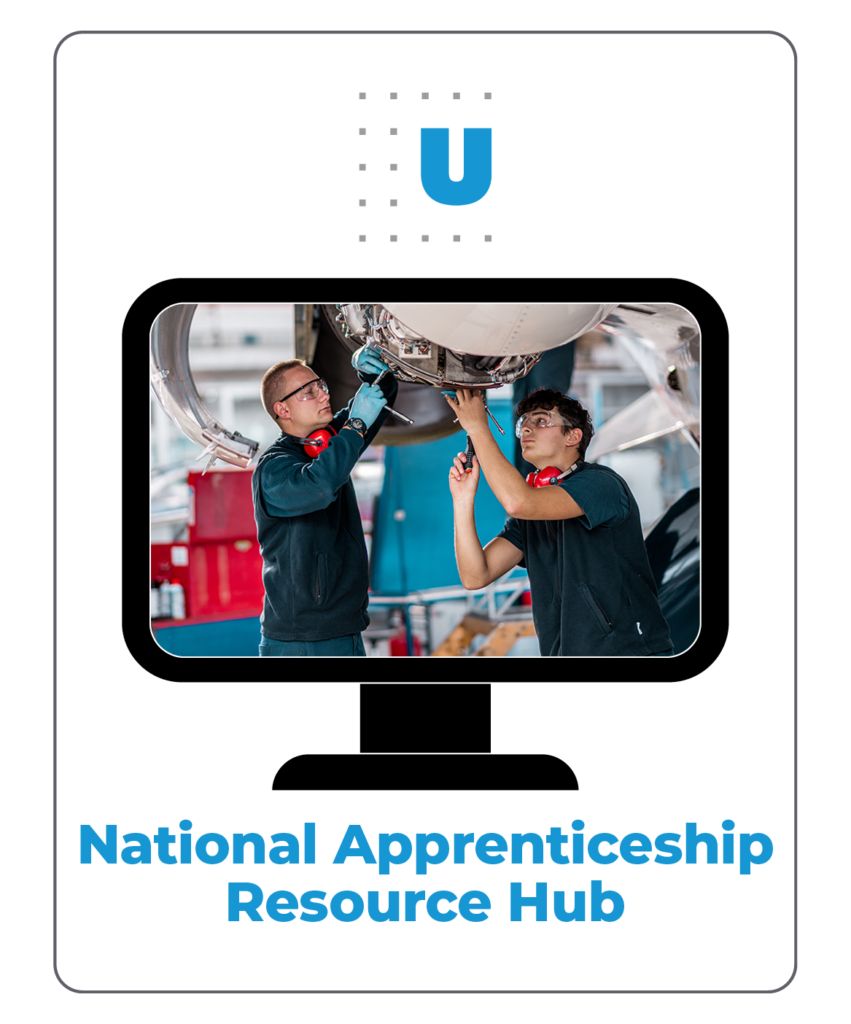
National Apprenticeship Resource Hub
Apprenticeship Programs can help employers develop their future workforce and meet their business needs. The National Apprenticeship Resource Hub includes National Occupational Frameworks which can help develop a new apprenticeship program or refine an existing program. Each framework outlines the basic information sponsors need to register an apprenticeship program in their occupation.
The Urban Institute
December 2024
LEARN MORE
The National Apprenticeship Resource Hub includes Occupational Frameworks which can help develop a new apprenticeship program or refine an existing program. Each framework outlines the basic information sponsors need to register an apprenticeship program in their occupation including an occupational overview that describes the occupation, alternative job titles, and any prerequisites; a work process schedule that outlines what organizations can expect apprentices to learn on the job and the required hours; and a related technical instruction outline that presents considerations for courses and training apprentices can pursue during the apprenticeship. The National Occupational Frameworks also include detailed instructions on how to use them when creating your registration application.
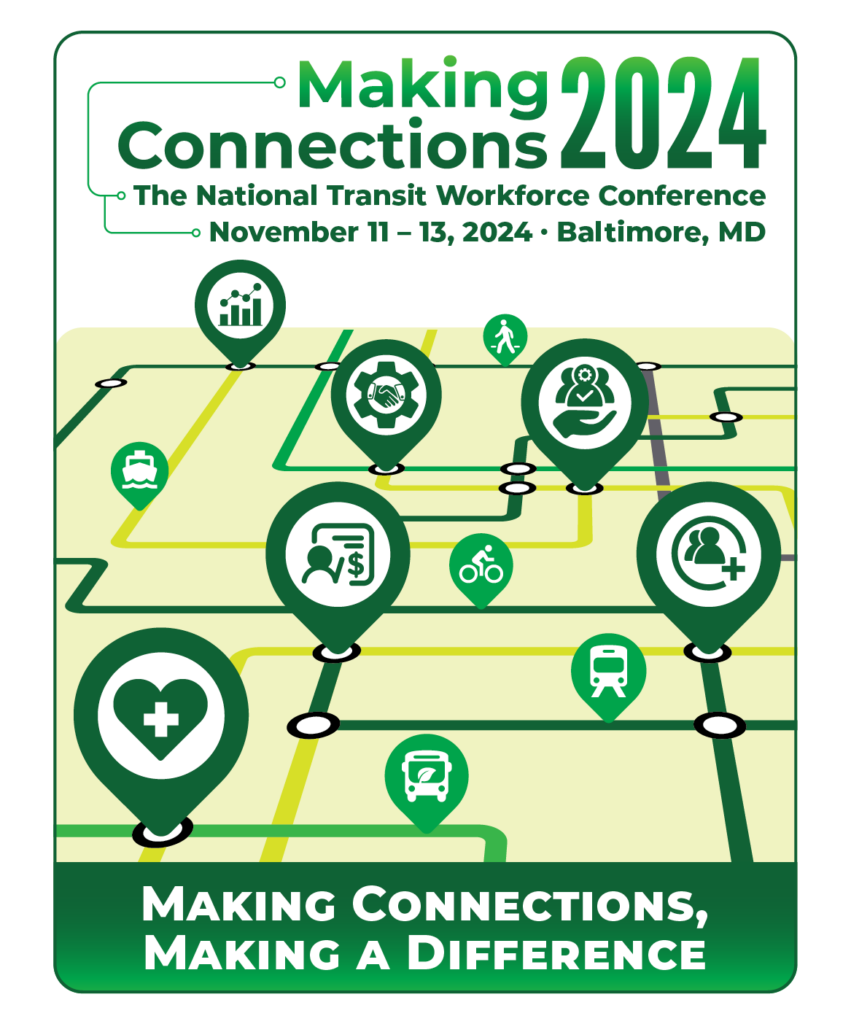
Making Connections 2024 – The College Connection: Strategies for Effective Partnerships
This session about partnerships between transit and local colleges was presented as part of TWC’s Making Connections 2024 transit workforce conference in November, 2024.
Transit Workforce Center
November 2024
TOPICS: Apprenticeship, Career Pathways, Hiring and Recruitment, Making Connections Conference, Retention, Training
Session Description: Strong partnerships between transit and local colleges across the country currently support recruitment, retention, apprenticeships and other career advancement initiatives developed by agencies and their workforce partners. Presenters in this session reviewed and discussed several different models of industry-education partnerships, focusing on how to establish productive working relationships with local colleges to advance workforce development goals.
Moderator:
- Patricia Greenfield: Senior Director, Workforce Education – International Transportation Learning Center / Transit Workforce Center
Speakers:
- Jamaine “G” Gibson: Director of Apprenticeships and Workforce Development – Amalgamated Transit Union
- Jason Abbott: Executive Director, Workforce Operations – Cuyahoga Community College
- Celeste Chavis: Interim Chair and Professor, Transportation & Urban Infrastructure Studies – Morgan State University (Baltimore)
- Rich Diaz: Workforce Development Coordinator – Amalgamated Transit Union Local 1575
- Rob Gamble: Sr Workforce and Academic Strategist – California Transit Works!

Making Connections 2024 – How Do Technicians Learn? Exploring Successful Approaches for Developing Skills
This session about training transit technicians was presented as part of TWC’s Making Connections 2024 transit workforce conference in November, 2024.
Transit Workforce Center
November 2024
LEARN MORE
Session Description: This session delved into the most effective methods for training technicians to maintain today’s fleets of complex technology. We focused on proven strategies, such as starting with the fundamentals and progressing to hands-on training. Additionally, we discussed the value of mentorship and apprenticeship to facilitate the retention of the trained frontline workforce.
Moderator:
- Jason Macumber: Senior Advisor of Workforce Development and Technology – International Transportation Learning Center / Transit Workforce Center
Speakers:
- Russell Anderson: Director Bus Maintenance Training – California Transit Works!
- Staci Hanna: Maintenance Training Manager – TriMet
- Brian Markey: Chief Executive Officer – Custom Training Aids Inc.

Making Connections 2024 – Apprenticeship 101 – How Transit Apprenticeship Operates
This session about transit apprenticeships was presented as part of TWC’s Making Connections 2024 transit workforce conference in November, 2024.
Transit Workforce Center
November 2024
TOPICS: Apprenticeship, Career Pathways, Hiring and Recruitment, Making Connections Conference, Policy and Planning, Retention
Session Description: Apprenticeship programs are rapidly expanding at transit locations across the country. With quality training tied to clearly-identified career ladders and advancement, these programs are commonly regarded as the “gold standard” of workforce development. Documented benefits include increased retention, reductions in absenteeism, and the creation of a sustainable talent pipeline. These programs also result in better employee morale and a more engaged workforce. In this session, presenters walked through the essential steps to developing, registering, and implementing an apprenticeship program. Attendees heard from and engaged with transit labor and management about their joint programs including bus maintenance, traction power, HVAC/facilities, and signals/communications—and explore how to locate and access resources to support new and existing programs.
Moderator:
- Brian J. Turner: Founding Director – International Transportation Learning Center
Speakers:
- Michelle Allison: General Manager – King County Metro (WA)
- Maurice Beard: Senior Workforce Development Advisor –
- Norman Blessant: Financial Secretary/Treasurer – Amalgamated Transit Union Local 381 (UT)
- Rod Dunn: President – Amalgamated Transit Union Local 382 (UT)
- Brandee Gross: Program Manager, Workforce Development – Maryland Department of Transportation
- Dimas Koral-Arocho: Program Manager – King County Metro (WA)
- Stephanie Lewis: Workforce Development Project Manager – Center for Urban Transportation Research
- Kylee Parker: Shop Steward/Joint Apprenticeship Committee Chairman – Amalgamated Transit Union Local 1300 (MD)
- Jeff Stambaugh: Vice President – Amalgamated Transit Union Local 587 (WA)
- Greg Woodfill: President – Amalgamated Transit Union Local 587 (WA)






 CLEAR
CLEAR

